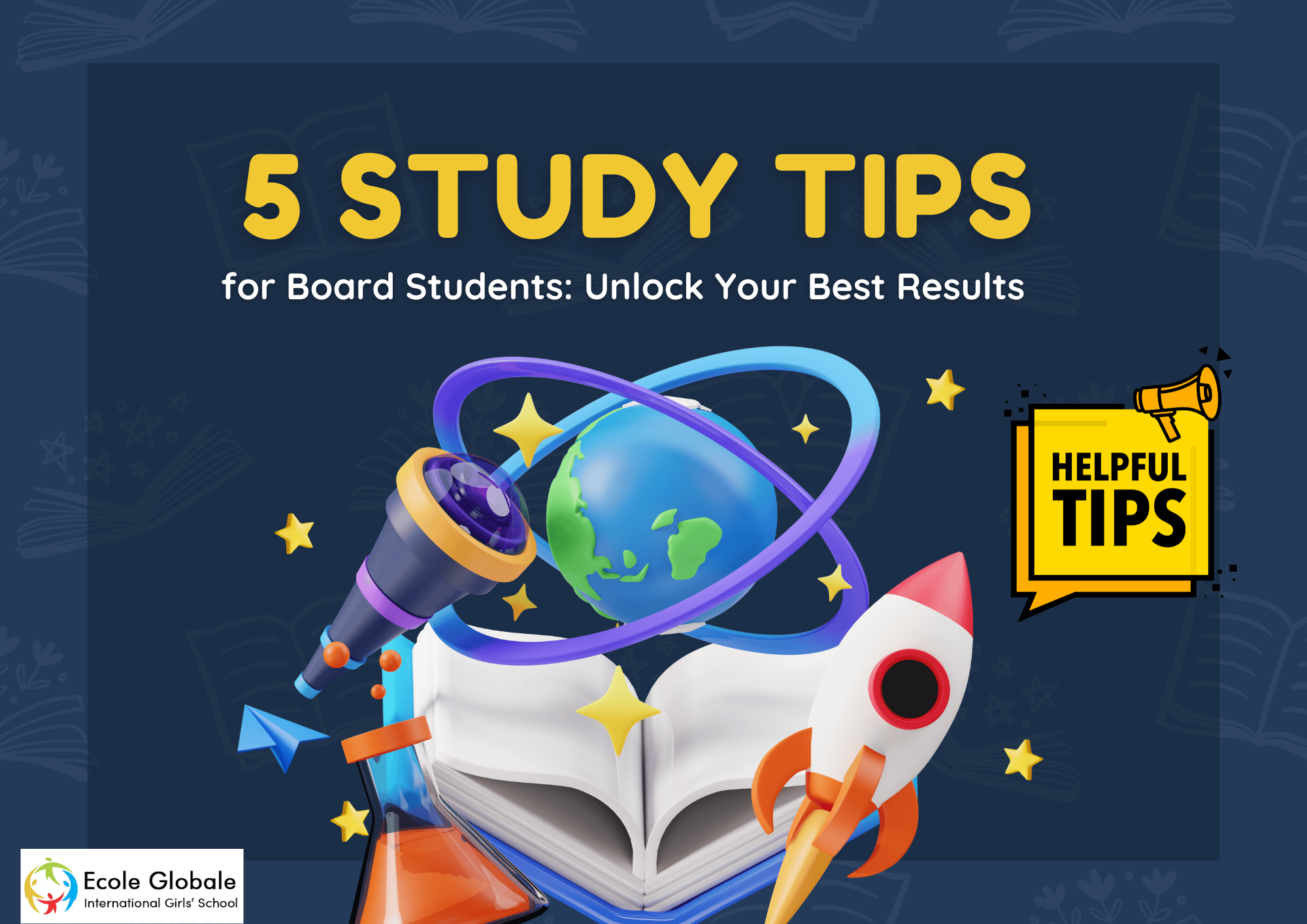Board examinations are a crucial milestone in a student’s academic journey. Achieving the best results requires not only hard work but also smart study strategies.
This Ultimate Guide presents five essential Study Tips tailored specifically for board students and their parents. These tips are designed to enhance learning efficiency, reduce stress, and ensure comprehensive preparation for exams.
Let’s explore these Study Tips that are expert-backed strategies to help you unlock your best results.
1. Create a Structured Study Schedule
One of the most effective Study Tips for board students is to develop a well-organized study schedule. A structured plan helps manage time efficiently, ensuring that all subjects receive adequate attention.
Why a Study Schedule is Important

A study schedule provides a clear roadmap of what needs to be accomplished each day. It prevents procrastination and ensures that students cover the entire syllabus systematically. By allocating specific time slots for each subject, students can balance their study sessions, avoiding the overwhelm that often comes with last-minute cramming.
How to Create an Effective Study Schedule
- Assess Your Syllabus: Start by breaking down the syllabus into manageable sections. Identify the topics that require more attention based on their complexity and your proficiency.
- Set Realistic Goals: Allocate time slots for each subject, ensuring that more challenging subjects receive additional study time.
- Include Breaks: Incorporate short breaks between study sessions to maintain focus and prevent burnout which comes under study tips. The Pomodoro Technique, which involves 25 minutes of focused study followed by a 5-minute break, can be particularly effective.
- Be Consistent: Stick to your schedule as closely as possible. Consistency builds discipline and reinforces good study habits.
- Adjust as Needed: Regularly review and adjust your schedule based on your progress and any unforeseen circumstances.
2. Utilize Active Learning Techniques
Active learning is a powerful Study Tips that enhances comprehension and retention of information. Unlike passive reading or rote memorization, active learning engages multiple cognitive processes, making study sessions more effective.
Benefits of Active Learning
Active learning techniques help students understand concepts deeply, rather than just memorizing facts. These Study Tips methods promote critical thinking, problem-solving, and the ability to apply knowledge in different contexts—skills that are essential for board exams.
Effective Active Learning Strategies
- Summarization: After studying a topic, summarize the key points in your own words. This reinforces understanding and helps identify any gaps in knowledge.
- Teaching Others: Explain the material to a friend, family member, or even yourself. Teaching is a powerful way to solidify your understanding.
- Mind Mapping: Create visual representations of information using mind maps. This helps in organizing thoughts and seeing connections between different topics.
- Practice Questions: Solve past exam papers and sample questions. This not only tests your knowledge but also familiarizes you with the exam format and question types.
- Group Study: Engage in group study sessions where you can discuss and debate topics. This collaborative approach can provide new insights and enhance learning.
3. Leverage Technology and Online Resources
In today’s digital age, technology offers a wealth of resources that can complement traditional study methods. Utilizing these tools is an essential Study Tips for board students aiming to maximize their preparation.
Advantages of Using Technology

Technology provides access to a vast array of educational materials, interactive learning platforms, and personalized study aids. These resources cater to different learning styles, making studying more engaging and effective.
Useful Technological Tools and Resources
- Educational Apps: Apps like Khan Academy, Coursera, and Quizlet offer tutorials, practice exercises, and flashcards that can reinforce learning.
- Online Tutorials and Videos: Platforms like YouTube host numerous educational channels that explain complex concepts in an easy-to-understand manner.
- Interactive Simulations: Science subjects can benefit from interactive simulations that demonstrate experiments and phenomena, enhancing practical understanding.
- Digital Flashcards: Tools like Anki and Memrise help in memorizing key terms and definitions through spaced repetition.
- Study Management Tools: Apps like Trello or Todoist can help organize study schedules, track progress, and set reminders for important tasks.
4. Focus on High-Yield Topics
Focusing on high-yield topics is a strategic Study Tips that ensures you cover the most important areas of your syllabus efficiently. High-yield topics are those that are frequently tested or foundational for understanding other subjects.
Identifying High-Yield Topics
- Review Past Papers: Analyzing past exam papers helps identify patterns in question types and frequently tested topics.
- Consult Teachers: Teachers can provide insights into which topics are essential and likely to appear in exams.
- Syllabus Emphasis: Pay attention to topics that are given more weight in the syllabus or are part of the core curriculum.
Strategies to Master High-Yield Topics

- Prioritize Study Time: Allocate more Study Tips and study sessions to high-yield topics to ensure thorough understanding.
- Deep Dive into Concepts: Go beyond surface-level knowledge by exploring the underlying principles and applications of these topics.
- Use Multiple Resources: Supplement your study with textbooks, online materials, and video tutorials to gain a comprehensive understanding.
- Regular Revision: Consistently review high-yield topics to reinforce memory and ensure long-term retentions.
5. Maintain a Healthy Lifestyle
Maintaining a healthy lifestyle is a crucial yet often overlooked Study Tips that significantly impacts academic performance. Physical and mental well-being directly influence your ability to concentrate, retain information, and perform study skills well under exam conditions.
Key Aspects of a Healthy Lifestyle
- Balanced Diet: Eating nutritious foods fuels your brain and body, enhancing focus and energy levels. Include a variety of fruits, vegetables, proteins, and whole grains in your diet.
- Regular Exercise: Physical activity improves blood circulation, reduces stress, and boosts overall mood. Incorporate activities like walking, jogging, yoga, or any sport you enjoy.
- Adequate Sleep: Quality sleep is essential for memory consolidation and cognitive function. Aim for 7-9 hours of sleep each night to ensure your brain is well-rested and ready to learn.
- Stress Management: Techniques such as meditation, deep breathing exercises, and mindfulness can help manage stress and anxiety, keeping you calm and focused during studies and exams.
- Hydration: Staying hydrated is vital for maintaining concentration and preventing fatigue. Drink plenty of water throughout the day.
Balancing Study and Rest

Creating a balance between study and rest is vital for sustaining long-term academic performance. Overworking can lead to burnout, while adequate rest ensures that you remain productive and motivated.
- Scheduled Breaks: Incorporate regular breaks into your study schedule to relax and recharge.
- Leisure Activities: Engage in hobbies and activities that you enjoy to take your mind off studies and reduce stress.
- Social Interaction: Spending time with family and friends provides emotional support and helps maintain a healthy mental state.
Conclusion
Achieving outstanding results in board examinations requires a combination of effective Study Tips, disciplined effort, and a balanced lifestyle.
By creating a structured study schedule, utilizing active learning techniques, leveraging technology, focusing on high-yield topics, and maintaining a healthy lifestyle, board students can optimize their study sessions and unlock their best results.
Parents play a crucial role in supporting their children by providing the necessary resources, encouragement, and a conducive study environment. Implementing these Study Tips expert-backed strategies will not only help in covering the syllabus efficiently but also build a strong foundation for future academic and personal success.









